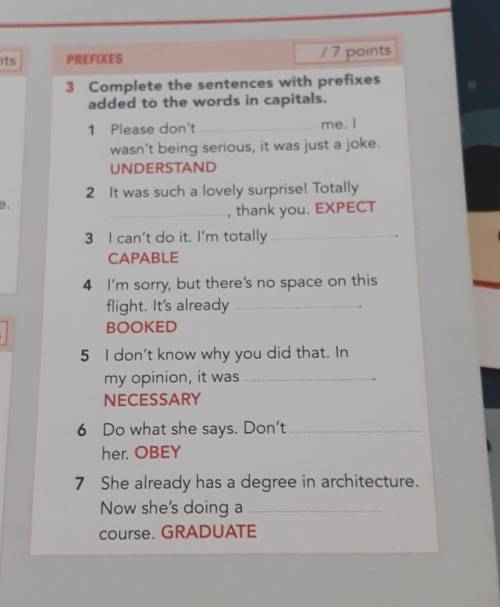PREFIXES 77 points 3 Complete the sentences with prefixes added to the words in capitals. 1 Please don't me. wasn't being serious, it was just a joke. UNDERSTAND 2 It was such a lovely surprise! Totally thank you. EXPECT 3 I can't do it. I'm totally CAPABLE 4 I'm sorry, but there's no space on this flight. It's already BOOKED 5 I don't know why you did that. In my opinion, it was NECESSARY 6 Do what she says. Don't her. OBEY car 7 She already has a degree in architecture. Now she's doing a course. GRADUATE

Другие вопросы по теме Английский язык
Популярные вопросы
- Сделайте синтаксический разбор предложения. Под её влиянием родители установили...
3 - 8. Прочитай пословицы. О каких ценностях в них говорится? Спиши пословицы,...
3 - 19 – 7x 20 – 3(x – 5)как решить?...
2 - No4. Задача. В турпоход собралось группа из 280 учеников. Отношение девочек...
1 - • Лиевезе tена на Караг авах нер во 4t european Legenda и чекорирмту Аар...
3 - C. Join the sentences using who, which, where and whose. 1. Alex speaks...
3 - Выполни проверку для данного примера. 689 794:1 000 = 689 (OCT. 794) 689...
2 - 4-тапсырма. Мәтіндегі жер-су атаулары мен өндіріске қатысты термин сөздердің...
2 - Пропуски, характеризуя город Бразилиа. 2000-3000 мм Субэкваториальный 1000-2000...
3 - Сравни Пугачёву и Екатерину. В каких эпизодах они ведут себя очень похоже?...
3
Explanation: The prefix "mis-" means "wrongly" or "incorrectly." In this sentence, "misunderstand" means to not understand something correctly or to interpret it in the wrong way. By adding the prefix "mis-" to the word "understand," we change the meaning to "not understand correctly."
2. It was such a lovely surprise! Totally unthank you.
Explanation: The prefix "un-" means "not." In this sentence, "unthank" means to "not thank" or to show no gratitude. By adding the prefix "un-" to the word "thank," we change the meaning to "not thank" or the opposite of thanking.
3. I can't do it. I'm totally incapable.
Explanation: The prefix "in-" or "im-" means "not" or "without." In this sentence, "incapable" means "not capable" or "unable." By adding the prefix "in-" to the word "capable," we change the meaning to "not capable" or "unable."
4. I'm sorry, but there's no space on this flight. It's already fully booked.
Explanation: The prefix "fully-" means "completely" or "thoroughly." In this sentence, "fully booked" means that all the seats or spaces on the flight have been reserved or taken. By adding the prefix "fully-" to the word "booked," we change the meaning to "completely booked" or "thoroughly reserved."
5. I don't know why you did that. In my opinion, it was unnecessary.
Explanation: The prefix "un-" means "not" or "opposite of." In this sentence, "unnecessary" means "not necessary" or "not needed." By adding the prefix "un-" to the word "necessary," we change the meaning to "not necessary" or "not needed."
6. Do what she says. Don't disobey her.
Explanation: The prefix "dis-" means "not" or "opposite of." In this sentence, "disobey" means to "not follow" or "not obey" someone's instructions. By adding the prefix "dis-" to the word "obey," we change the meaning to "not obey" or "opposite of obeying."
7. She already has a degree in architecture. Now she's doing a post-graduate course.
Explanation: The prefix "post-" means "after" or "following," and in this case, it is used to indicate further studies after obtaining a degree. In this sentence, "post-graduate" means a course or program of study that is pursued after completing an undergraduate degree. By adding the prefix "post-" to the word "graduate," we change the meaning to "after graduating" or "following a degree."